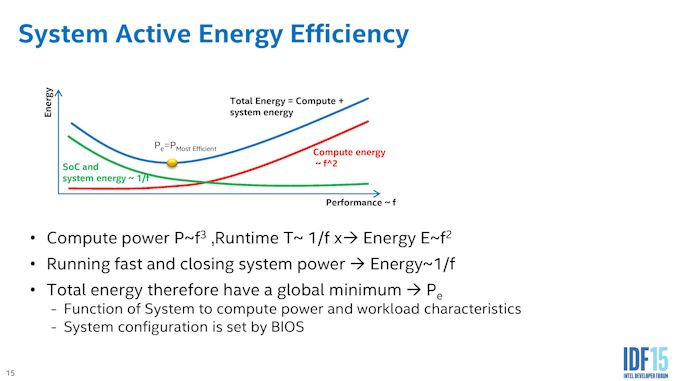Upgrading from an Intel Core i7-2600K: Testing Sandy Bridge in 2019
by Ian Cutress on May 10, 2019 10:30 AM EST- Posted in
- CPUs
- Intel
- Sandy Bridge
- Overclocking
- 7700K
- Coffee Lake
- i7-2600K
- 9700K
Power Consumption
One of the risk factors in overclocking is driving the processor beyond its ideal point of power and performance. Processors are typically manufactured with a particular sweet spot in mind: the peak efficiency of a processor will be at a particular voltage and particular frequency combination, and any deviation from that mark will result in expending extra energy (usually for better performance).
When Intel first introduced the Skylake family, this efficiency point was a key element to its product portfolio. Some CPUs would test and detect the best efficiency point on POST, making sure that when the system was idle, the least power is drawn. When the CPU is actually running code however, the system raises the frequency and voltage in order to offer performance away from that peak efficiency point. If a user pushes that frequency a lot higher, voltage needs to increase and power consumption rises.
So when overclocking a processor, either one of the newer ones or even an old processor, the user ends up expending more energy for the same workload, albeit to get the workload performed faster as well. For our power testing, we took the peak power consumption values during an all-thread version of POV-Ray, using the CPU internal metrics to record full SoC power.

The Core i7-2600K was built on Intel’s 32nm process, while the i7-7700K and i7-9700K were built on variants of Intel’s 14nm process family. These latter two, as shown in the benchmarks in this review, have considerable performance advantages due to microarchitectural, platform, and frequency improvements that the more efficient process node offers. They also have AVX2, which draw a lot of power in our power test.
In our peak power results graph, we see the Core i7-2600K at stock (3.5 GHz all-core) hitting only 88W, while the Core i7-7700K at stock (4.3 GHz all-core) at 95 W. These results are both respectable, however adding the overclock to the 2600K, to hit 4.7 GHz all-core, shows how much extra power is needed. At 116W, the 34% overclock is consuming 31% more power (for 24% more performance) when comparing to the 2600K at stock.
The Core i7-9700K, with eight full cores, goes above and beyond this, drawing 124W at stock. While Intel’s power policy didn’t change between the generations, the way it ended up being interpreted did, as explained in our article here:
Why Intel Processors Draw More Power Than Expected: TDP and Turbo Explained
You can also learn about power control on Intel’s latest CPUs in our original Skylake review:
The Intel Skylake Mobile and Desktop Launch, with Architecture Analysis











213 Comments
View All Comments
MDD1963 - Saturday, May 11, 2019 - link
my 7700K (turbos to 4.7 GHz all core in Balanced mode) will likely stand pat for quite a while...!Targon - Tuesday, May 14, 2019 - link
Quad-core will seem weak in another two years or so.zodiacfml - Saturday, May 11, 2019 - link
Higher core counts are long overdue. I thought my i3-8100 I bought at end of 2017 is decent. Turns out, it is entry level for doing something creative on a PC. A few months after, AMD arrived with the highr core count Ryzens.I hope to get an 8 core this yaear or next.
yankeeDDL - Saturday, May 11, 2019 - link
Great article. Would love to see more of this kind. I commented along this line on some previous articles. Not everybody upgrades from one gen to the next (in fact, who does?), so incremental review are useful only from a technical perspective (which is already quite a bit), but somebody with a 4-5 years old PC would struggle to find a reference.Personally, I would have loved to see Ryzen 2*** added to the picture (not sure if there's something that costs as much as the i7-9700K, but a 2800 seems relevant).
Thanks again.
trentbg - Saturday, May 11, 2019 - link
Still running i7-2700k on my main pc and looking to replace it any time soon, at 4.7ghz most games run over 100fps. My other machine is still on Xeon W3690, OCd to comfortable 4ghz on all 6 cores and again is crashing every game, why upgrade?teamet - Saturday, May 11, 2019 - link
For anyone still using a Core i7-2600K for CPU testing, even when overclocked, it’s time to feel the benefits of an upgradeRSAUser - Saturday, May 11, 2019 - link
For most the benefits are minimal, so my reply is, "why"?Icehawk - Saturday, May 11, 2019 - link
My OC’d 3770k is still going strong, moved it to my wife and I run a 8700k now but I only upgraded because her 3rd gen i5 died not because I felt a strong performance need. I’m primarily a gamer. Where I did see an uplift (and needed it desperately) is in my HEVC transcoding.Sahrin - Saturday, May 11, 2019 - link
Why on Earth would you post an upgrade comparison of only Intel CPU's?BushLin - Saturday, May 11, 2019 - link
Because during that period AMD's products were trash?